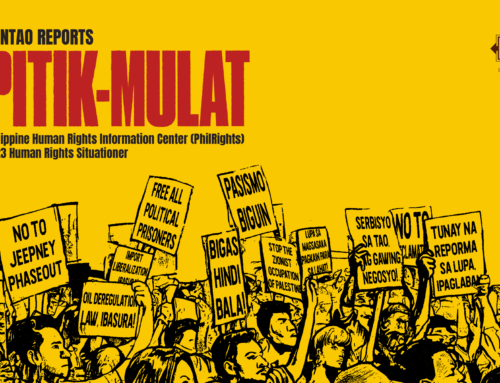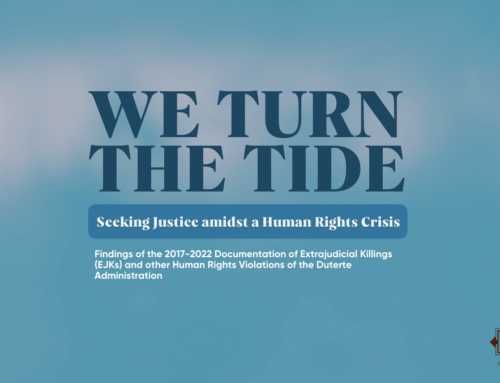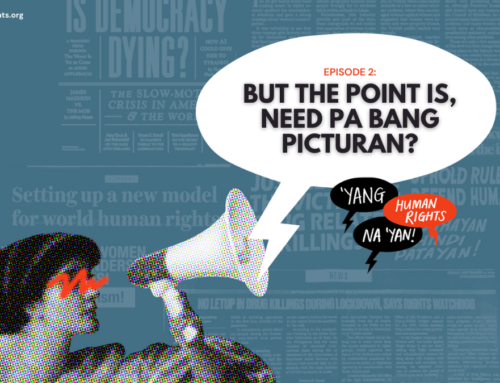IN ITS 41st Session on November 3-21, 2008, the Committee on Economic, Social and Cultural Rights of the UN Economic and Social Council reviewed the report of the Philippines on its compliance with the provisions of the International Covenant on Economic, Social and Cultural Rights (ICESCR).
In its Concluding Observations, the Committee urged the Philippine government, as a signatory to the ICESCR, to implement the following:
1. Justiciability of ESC rights: Ensure the direct applicability of the Covenant provisions in the Philippine legal system.
2. The Commission on Human Rights (CHR): Strengthen the CHR by, among others, including ESC rights in its mandate and allocating adequate budget and by adopting the CHR Charter.
3. Widespread corruption: Intensify efforts against corruption; train the police and the judiciary on the strict application of anti-corruption laws, conduct awareness-raising campaigns, and ensure transparency of the conduct of public authorities.
4. Enforced disappearances and extrajudicial killings: Protect human rights defenders; investigate all alleged cases and prosecute alleged perpetrators.
5. Exploitation of natural resources and the rights of Indigenous Peoples: Fully implement the 1997 Indigenous Peoples Rights Act (IPRA), in particular ensure IP rights to ancestral domains and ensure that economic activities, especially mining, do not adversely affect IP rights.
6. Decreasing spending on social services: Increase the budget on social services such as housing, health and education to achieve progressive realisation of ESC rights provided for in the Covenant.
7. Laws that are discriminatory against women: a comprehensive review of its legislation with a view to ensuring gender equality in all fields of life; in particular, to adopt the Marital Infidelity Bill, and to review the interpretation of the Code of Muslim Personal Laws of the Philippines.
8. High unemployment/underemployment; lack of employment opportunities: Increase efforts to reduce unemployment/ underemployment through specifically targeted measures, including programmes aimed at creating employment opportunities at the local level for young, unskilled and inexperienced workers living in urban areas and persons living in rural areas.
9. Lack of access to labor and social security laws among informal sector workers: Intensify efforts to regularise persons working in the informal economy, by ensuring adequate protection under existing labor and welfare legislation.
10. Overseas Filipino Workers (OFWs): Implement effective policies to protect the rights of OFWs
a. improve existing services provided by the Office for the Legal Assistance for Migrant Workers Affairs and diplomatic missions in countries of destination;
b. bilateral agreements with those countries of destination where discriminatory treatment and abuse are more frequent; and
c. provide assistance to those seeking justice and ensure that reports are investigated by competent authorities of the countries of destination.
11. Workers’ standard of living: Ensure that the minimum wages provide workers with an adequate standard of living for themselves and their families; extend the applicability of the minimum wage law to sectors where it does not apply, and enforce legal minimum wages.
12. Health and safety of workers: Provide sufficient resources to the Department of Labour and Employment (DOLE) to enable regular and independent inspections aimed at ensuring compliance with the occupational health and safety legislation; monitor closely the implementation of the 2004 Labour Standards Enforcement Framework so as to ensure that the application of the self-assessment mechanism does not undermine the effective realisation of the right to safe and healthy working conditions in establishments with more than 200 workers.
13. Legislation on divorce: Adopt legislation recognizing the right of men and women to divorce, to obtain the legal severance of marital ties and to remarry after divorce.
14. Republic Act No. 8353: Strengthen the protection afforded by the Act Redefining Rape as a Crime against Person to women victims of marital rape by repealing the possibility that the criminal liability of the husband be extinguished by the subsequent forgiveness of the wife.
15. Trafficking of women and children; low number of prosecution and conviction of traffickers: Combat trafficking by supporting programs and information campaigns to prevent trafficking, providing mandatory training for law enforcement officials, prosecutors and judges on the anti-trafficking legislation and increasing the provision of medical, psychological and legal support to victims.
16. Child labor: Combat child labor and protect children from all forms of sexual and economic exploitation
a. strengthen national legislation prohibiting child labor in accordance with international standards;
b. increase the number of labor inspections;
c. ensure the imposition of fines and criminal sanctions to persons making use of illegal child labor;
d. organize mandatory training for law enforcement officials, prosecutors and judges; and e. adopt all appropriate measures to facilitate recovery and access to educational opportunities for former child workers.
A national survey on the nature and extent of child labor is also recommended.
17. Increasing number of persons living below the poverty line; income disparities and inequalities in income distribution: Allocate sufficient funds for the anti-poverty program, ensuring full integration of ESC rights in the strategy. Include in the next periodic report in 2013 disaggregated data on the impact of anti-poverty measures.
18. Urban poor and housing; insufficient budget for housing programs: Allocate sufficient funds for program that provide security of tenure and affordable housing, particularly to members of the most disadvantaged and marginalised groups.
19. Large-scale illegal forced evictions; lack of effective consultation and legal redress for victims and lack of adequate measures to provide sufficient compensation or adequate relocation sites
a. ensure the effective implementation of the Urban Development and Housing Act (UDHA) of 1992 (Republic Act No. 7279) and other laws and regulations prohibiting illegal forced evictions and demolitions;
b. reinforce the mandate of the Presidential Commission for the Urban Poor “as the sole clearing house for the conduct of demolition and eviction”, in accordance with Executive Order No. 152 of 2002;
c. undertake open, participatory and meaningful consultations with affected residents and communities prior to implementing development and urban renewal projects;
d. ensure that persons forcibly evicted from their properties be provided with adequate compensation and/or offered relocation; and
e. guarantee that relocation sites are provided with basic services and adequate facilities at the time the resettlement takes place.
20. Reproductive health: Protect the sexual and reproductive rights of women and girls, by reducing maternal and infant mortality and facilitating access to sexual and reproductive health services, including access to family planning, and information. Address the problem of maternal deaths as a result of clandestine abortions, and consider reviewing its legislation criminalising abortion in all circumstances.
The Committee also encouraged the Philippine Government to ratify ILO conventions No. 169 (1989) concerning Indigenous and Tribal Peoples in Independent Countries, No.81 on labor inspection, and No. 102 on Minimum Standards of Social Security.
Source:
UN Economic and Social Council – Committee on Economic, Social and Cultural Rights (2008). Consideration of Reports Submitted by States Parties Under Articles 16 and 17 of the Covenant (Advanced unedited version).







